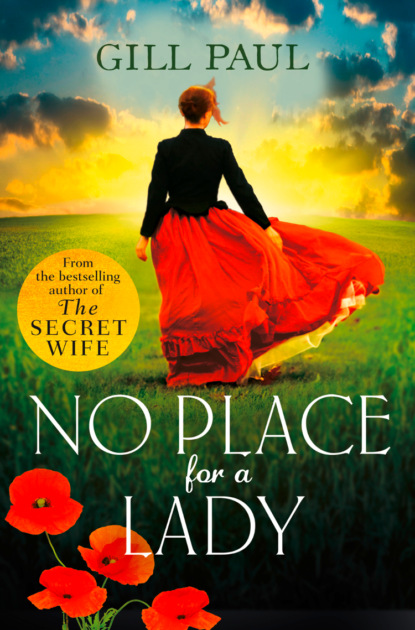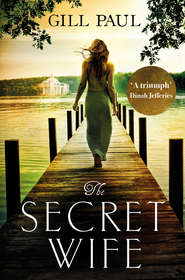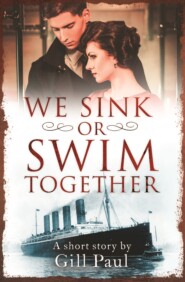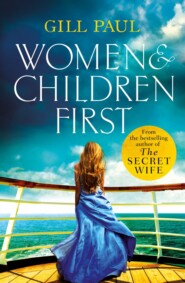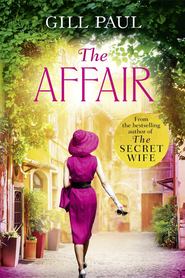По всем вопросам обращайтесь на: info@litportal.ru
(©) 2003-2024.
✖
No Place For A Lady: A sweeping wartime romance full of courage and passion
Автор
Год написания книги
2018
Настройки чтения
Размер шрифта
Высота строк
Поля
‘We’re surrounded by the bravest and best of the British army, my love. What could possibly happen?’
He built a little campfire on which to boil water for tea, and in lieu of milk he added a glug of rum to his cup.
‘Anyone care to join our party?’ he called to those round about. ‘Bring your own hooch!’
Bill and Adelaide joined them, and several of the men, all passing round their bottles. Mrs Williams and her husband Stan perched on the edge of the group, and she and Lucy exchanged smiles.
‘What about a sing-song?’ Charlie suggested, and burst into a tenor rendition of the popular ballad, ‘Thou art gone from my gaze, like a beautiful dream’. He sang the first verse, then turned to Lucy: ‘I don’t know any more of the words, my dear, but perhaps you do?’
She took over – ‘In the stillness of night, when the stars mildly shine’ – and the group fell silent as they listened to her pretty singing voice, quite the finest many of them had heard. For years she had been studying under an Italian singing master, hired by her mother so that there would always be music in the house. Lucy put her heart into it, wanting Charlie to be proud of her.
When she reached the end he cheered ‘Bravo!’, and the others joined his applause. One soldier piped up with the lively ‘Cheer, boys, cheer!’ and Charlie rose to his haunches and began a clumsy Cossack dance, hopping, kicking and falling over in a parody of the well-known Russian dance style. Everyone laughed until their sides hurt. It was clear he was the company jester and Lucy suddenly felt a pang of sadness that her mother never met him. Their characters were so similar she was sure they would have got along famously. Mama would never have allowed Dorothea to cause this horrid rift in the family. She would instantly have welcomed Charlie as one of them.
When Lucy crawled into her bedding later, Charlie was inebriated and keen to make love. He cupped her breast, squeezing it a little too hard, while trying to push up her skirts.
‘We can’t,’ she shushed. ‘Others will hear.’ The nearest men were only ten paces distant and although they appeared to be asleep, Lucy didn’t want to risk them seeing or hearing anything compromising. Charlie grumbled but soon gave up, fell back on his bedding and began to snore.
Lucy lay awake, alert for movements on the ground. Dorothea’s words about scorpions and snakes echoed through her head, but all she saw in the moonlight was a large beetle with yellow markings and sharp black pincers. She watched it for a while, wondering if it might bite her in her sleep. And then she reminded herself that she was a captain’s wife, who must be strong to survive this extraordinary experience. She picked up a rock and crushed the beetle, then settled down to sleep.
Bugles sounded at daybreak and everyone rose to pack any belongings that had been unpacked the night before. Lucy washed her face and rearranged her hair, smoothing down the creases in her pale blue silk gown as best she could. They were travelling eight miles north to a place called Silistria, where the Russian forces were under siege by the Ottomans, and Lucy felt a knot in her stomach when she thought about that. But for now, Charlie helped her and Adelaide to climb onto a gun carriage to ride with their luggage and they enjoyed the drive through the countryside while it was still early enough to escape the glare of the sun: the sky was cloudless but a light breeze made the temperature pleasant.
Adelaide transpired to be something of an expert on wildflowers and plants and she identified the blooms they passed in fields and hedgerows: wild roses, larkspur, borage, even purple heather, which Lucy had always thought to be uniquely Scottish. ‘I enjoy gardening,’ she explained. ‘We have a pretty garden at our house in Oxfordshire.’
When they arrived at Silistria, the French had already set up camp on one side of the plain, and Lucy caught sight of the red fezzes of the Turkish soldiers further off. The area left for the British troops lay on swampy ground near a river and black clouds of flies rose into the air as they stepped on it.
‘We’ll have our work cut out making this a home from home, but I’m sure we’re up to it,’ Adelaide called cheerfully.
They chose a patch that was slightly drier than the rest and some soldiers helped to unload Lucy’s trunk and bags onto the ground. Charlie and Bill approached, joshing each other.
‘I’ll put a plug in your nose if you snore as you did last night,’ Bill told Charlie, while Charlie insisted that Bill’s socks must never be allowed in the tent.
‘What’s going on?’ Adelaide smiled at them.
Charlie answered: ‘They brought four-man tents. Bill and I have decided we’d rather share with you ladies than with any of our men – if that’s acceptable to you, of course.’ He bowed theatrically.
‘I’ll hang a sheet down the middle so we have a modicum of privacy,’ Bill added.
Adelaide and Lucy looked at each other and agreed. In fact, Lucy felt greatly relieved that her friend would be so close at hand, even during the night. It would make her feel safer. She wondered what Dorothea would make of her sleeping under canvas. She would be forced to revise her low opinion of her younger sister if she saw how well she was coping with army life. Just the thought of Dorothea made her feel cross. Lucy shook her head, trying to erase the memory of their argument.
The men erected the tent in minutes then had to return to other duties, so Lucy and Adelaide began arranging their possessions, agreeing where the food store should be kept, where the washbowl should sit. There was nowhere to hang clothes so they had to stay folded in the trunk. Lucy’s tin bath could be used for bathing and also for washing clothes.
‘Isn’t it strange to think the Russians are so close, perhaps just a mile away?’ Lucy mused. ‘I haven’t heard any sound of their presence. Have you? I thought maybe there would be gunfire …’
They both stopped to listen but the only sound was the chirruping of insects in the long grass and the idle chatter of soldiers as they set up camp. The sun was a huge white orb and there was no shade from its unrelenting fire except inside the tent, where the air was stuffy and close. The ladies drank some tea, then loosened their corsets and lay down on their bedding rolls to snooze through the hottest hours of the day.
Chapter Seven (#ulink_7532882d-bbc5-5365-84a9-cddbe462cc33)
Two weeks after their arrival at camp, Charlie and Bill returned from the front with news that the Russians had abandoned Silistria and pulled back across the Danube. ‘We could be on the move again soon,’ Charlie warned, but they waited and no orders came. Meanwhile, the women had slipped into the rhythm of camp life. Every morning, before the heat grew too fierce, Lucy and Adelaide walked out to nearby farms to try and purchase fresh food to augment the chewy salt pork and tasteless dried biscuits distributed by the army. They didn’t speak the language, of course, but the local men seemed receptive to Lucy’s pretty face and Adelaide’s friendly smile and they were usually able to buy a loaf of sour black bread, gritty with sand from the floor on which the dough was kneaded, and perhaps some butter. Occasionally they were offered a few eggs or a scrawny chicken, but the only vegetables available seemed to be onions.
After a nap during the hottest hours, Lucy would venture out to call on some of the other women and chat to them as they washed clothes in the river or sat in the shade of a stand of trees. She began to know several: Mrs Williams, who had now resigned as lady’s maid to Fanny Duberly – ‘I can’t say I’m surprised,’ Lucy told her with a conspiratorial twinkle – and Mrs Blaydes, who had taken her place; Mrs Jenkins, a forthright Welshwoman, and Mrs Higgins, who was said to have too much of a taste for alcohol but whom Lucy found shy and very companionable. She noticed that the women had shed their corsets and petticoats in an attempt to keep cool; in fact, she caught a glimpse of Mrs Williams’ bare leg one day and realised she wasn’t even wearing drawers. Lucy still wore all her layers in order to maintain a fashionably full skirt; she was determined not to let her standards slip, even though the intense heat meant her undergarments were often drenched in perspiration. In her head, she frequently argued with Dorothea: ‘You see? I am sleeping in a tent, making tea on a campfire and, contrary to your expectations, I am perfectly capable of looking after myself.’
At night, they dined with the men on greasy communal stews doled out with slices of gritty bread, unless they had procured a chicken that day, in which case Adelaide roasted it over the fire with great competence. Lucy had never learned to cook and she watched carefully, eager to learn. After dinner, Charlie usually instigated the entertainment: sometimes it was a card game or a musical evening, but he also developed the raucous new sport of beetle racing. The men prowled the undergrowth collecting beetles then raced them along a length of sheet. They placed bets on the likely winners then cheered on their own creatures, to whom they gave names: Horatio the Horrible, Nimrod, Lucan and Raglan (the last two named after the cavalry commander and the army’s elderly general).
Bill didn’t care for gambling so he kept the ladies company on these evenings, conversing about books and music, or telling them what he had learned about the progress of the war: there were other fronts being fought in the Baltic, in the Eastern parts of Turkey and in Crimea, and it seemed possible they might be redeployed to one of them now the Russians had left Silistria.
‘I wish they would make their decision soon so we can fight our battles and go home,’ he told Lucy. ‘I can’t tell you how much I miss our little ones bouncing on my knee, or climbing all over me while pretending I am a big bear.’ He chuckled. ‘I love to hear them chattering in their serious little voices. Martha has an opinion on everything and is not shy of expressing it.’
‘He can never deny her,’ Adelaide smiled. ‘If I have refused her anything, she will go to her father and extract his consent in an instant. He can’t resist her.’
‘It’s true,’ Bill grinned. ‘You remind me of her, Mrs Harvington. I think you have steely determination beneath that pretty exterior.’
Lucy laughed. ‘Thank you for the compliment, sir. I certainly hope I am more than merely decorative.’
At bedtime, Charlie returned to their tent and they made love quietly but Lucy blushed scarlet the next morning when Adelaide and Bill greeted her; she could hear when they had marital relations, just from a change in breathing pattern, a slight shifting of bodies, so she knew they must hear Charlie and her as well.
Weeks passed, June turned to July, and the men had little to do but tend their horses and race beetles. It felt like an anti-climax after all the excitement of the journey and Lucy wondered about the cause of the delay in getting new orders. Meantime, she was concerned that the horses drank from the river they used for their own drinking water, and she had been disgusted to see some soldiers urinating into it. She began to venture further afield to a spring where she collected buckets of water for drinking, enjoying the walk in the cooler hours of early morning. However, one day after she returned from such a trip she felt movement on her legs and lifted her petticoat to find a slimy black slug about two inches long stuck to her calf. She lifted the hem of her drawers to find another. She shrieked hysterically and couldn’t stop shrieking.
‘Get them off me! Get them off me!’
Adelaide came running at the sound of Lucy’s terror: ‘Those are leeches,’ she quickly identified. ‘Don’t worry, they won’t harm you.’ She pulled a stick from their woodpile and used it to flick the creatures from Lucy’s leg to the ground. A thin trickle of blood ran down from each of the bites. ‘Perhaps you should check the other leg,’ she suggested, and when Lucy rolled up her drawers she screeched anew to find four leeches attached there as well. Adelaide removed them then picked them up one by one on her stick and tossed them onto the fire, where they squirmed and crackled.
When she had done, Lucy burst into hysterical tears, still patting her legs in case she had missed one. ‘I’m sorry …’ she sobbed. ‘I didn’t mean to make a fuss. I wanted to be brave.’
‘You are extremely brave, my dear. For all you knew they could have been poisonous. In fact, they have long been used in medicine for bloodletting and their bites do not have any harmful effects but it’s understandable you got a fright. Go lie in the tent and I’ll bring you some tea.’
‘Please don’t tell Charlie. I don’t want him to think I can’t cope.’
Adelaide put an arm round her shoulder. ‘Of course I won’t tell him. And I think you are coping extraordinarily well, given your tender years and sheltered upbringing. Every morning you manage to look so spruce and well turned-out you put me to shame! And every day I find you chatting to someone new; you are one of the most popular women in the British camp and an inspiration to all. I’m proud to call myself your friend.’
Still Lucy was ashamed of her outburst and determined to be stronger when next she was challenged. She wanted Charlie to think her a worthy officer’s wife. And although Dorothea wasn’t there to witness it, she was determined to prove herself to her as well.
On the 19th July, Mrs Blaydes came to Lucy and Adelaide’s tent with some alarming news: a soldier in the Royal Horse Artillery had died of low fever.
‘Oh my goodness!’ Lucy panicked. ‘There must be poisonous vapours in the earth here. What can we do to avoid them?’
‘Perhaps we should stay out of company until we can be sure there are no further cases,’ Adelaide suggested. ‘We could halt the beetle races and card games, just for now.’
‘Seems a shame,’ Mrs Blaydes said, ‘but I ’spect you’re right.’
Four days later sixteen men had died and it was confirmed as an outbreak of the deadly cholera. Lucy listened with shock to Charlie’s description: ‘I’ve heard a man can drop dead within hours of the first bout of diarrhoea, and his final hours are spent writhing on the floor with liquid spewing from both ends.’
Adelaide admonished him for scaring Lucy, but he continued: ‘It’s the truth. One captain in the Horse Artillery took an overdose of laudanum after his diagnosis as he couldn’t face the horrors of such a death.’
‘We must all keep out of harm’s way,’ Adelaide said firmly. ‘If we are careful, I am sure we will avoid it.’
Lucy wondered if Dorothea had encountered any cholera sufferers in her hospital and might have some advice. If only she could write to ask! But even if her sister replied, the letter would take too long reaching them to be of use and Dorothea would probably just tell her to come home. She had not received a reply to the letter she sent her father from Malta. She knew some letters were getting through to the troops because in Constantinople Adelaide had been handed several, with coloured drawings made by her children, which had left her withdrawn and silent all afternoon.
In camp, there were whispers about those affected by fever, and Lucy steered well clear of sufferers’ tents, anxious about vapours. She stopped wandering out to chat with other women at the cookhouse or down by the river, keeping close to the area around their tent in the hope that they had chosen an area of healthy soil. But her precautions were in vain. One evening, Bill was unable to eat his dinner but rose unsteadily and lurched towards the latrine trench where they emptied their bedpans. Shortly afterwards they heard him throwing up. Adelaide’s face turned pale as she rushed to help him. His forehead was hot and his eyes glassy. The diagnosis seemed clear.





